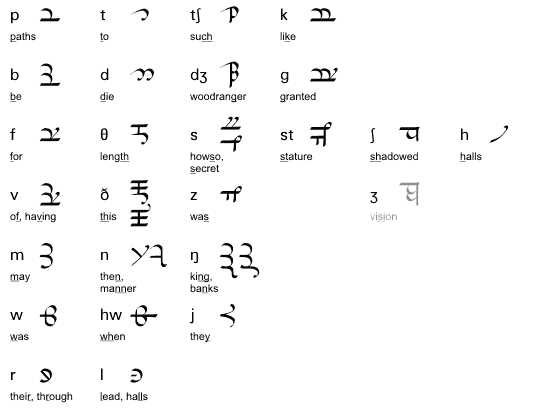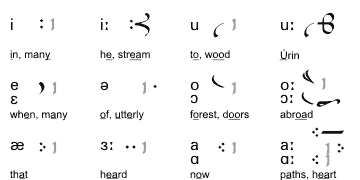This valuation is used in some of the early Sarati texts, possibly the very earliest. That makes it the oldest known form of the script.
Figure 1 shows the sound values of each sarat. (The sound values are given according to the International Phonetic Alphabet.) Below each sarat is written a word for which the sarat has been put to use (in either R1 or R2). The Roman letters that correspond to each sarat are underlined. Sarati shown in grey are unattested. Where several sarati are shown for one sound, they are interchangeable forms. The shorthand sarat for /st/ is optional. Doubled or long consonants are not distinguished.
Figure 1: Consonant signs in the Early Form


When following another consonant, especially at the end of words, the sounds [s] and [z] may be marked with diacritics. They are placed at the bottom or front of the preceding sarat, or sometimes (in the case of the [s]) connected to a trailing bow of the sarat, if it is equipped with one.
The vowel diacritics are listed in figure 2. The diacritics are placed either at the top or the bottom of the sarat. If placed at the top, they are pronounced before the sarat, if at the bottom, they are pronounced after it. The vowel diacritics are often omitted.
Figure 2: Vowel diacritics in the Early Form

The short carrier in the Early Form has the shape of a short dash running
parallel with the bar line. Long vowels are written in several different ways,
as shown in figure 2. Most vowels can be marked as long
by doubling the diacritic. Long /a/
is usually written on a long carrier, but on one occasion the diacritic is doubled
instead, the first diacritic being placed at the bottom of the preceding consonant,
the second at the top of the following.
Long /o/ is often written as a doubled diacritic.
It can also be indicated by using a special carrier, though this carrier has been
interpreted as a standard long carrier combined with an /o/
diacritic. Long /u/ is indicated by combining an
/u/ diacritic with the sarat for
/w/.
Below is a text written in the Early Form.

Ilúvatar was the first beginning, and beyond that no wisdom of the Valar or of Eldar or of Men can go.
— Rúmil, The Book of Lost Tales.